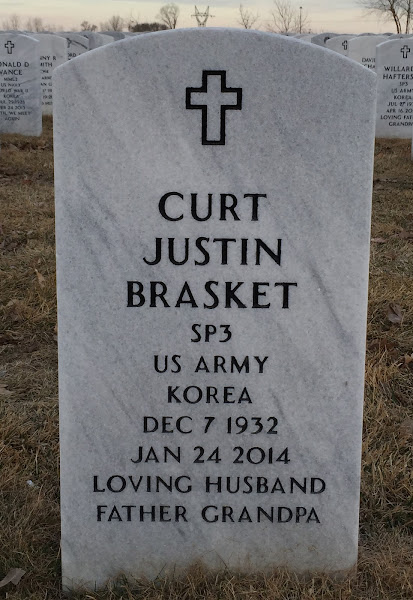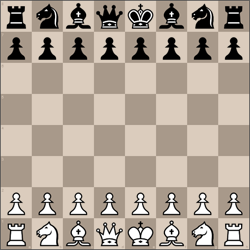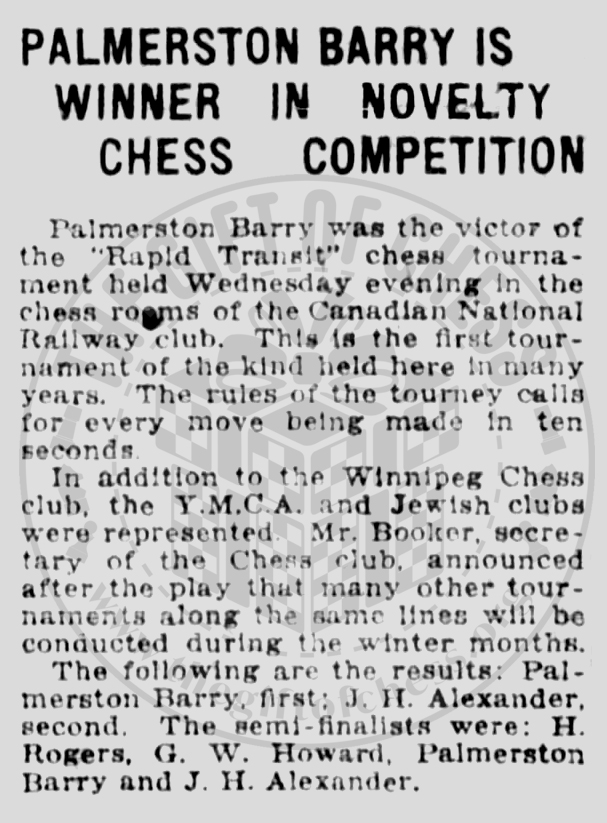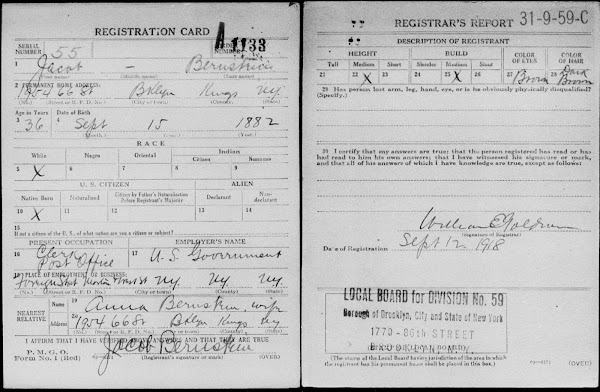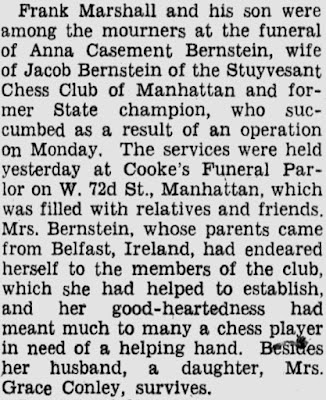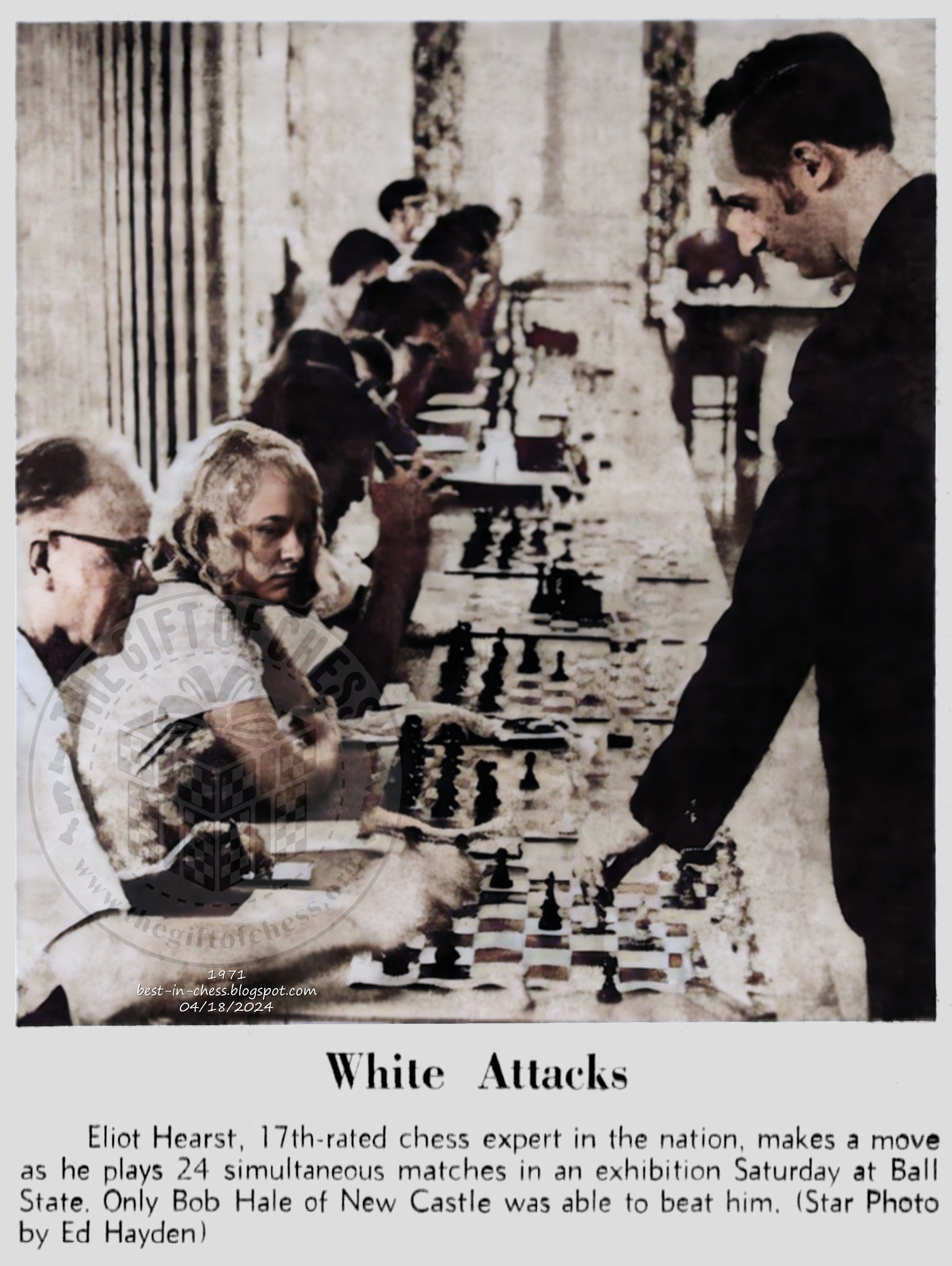Back to Home Index
January 23 1946
The Buffalo News, Buffalo, New York, Wednesday, January 23, 1946
'Action Shot' in a Battle of Wits
Arturo Pomar of Madrid is only 14 but he can hold his own at chess with the best of them. His opponent in London is Dr. Ossip Bernstein of Russia, winner of chess prizes since 1914, who is making a move after long deliberation, so this is an action picture. Arturito battled to a draw.
August 24 1946
The Courier-Journal, Louisville, Kentucky, Saturday, August 24, 1946
Russian Takes Chess Lead.
Groningen, The Netherlands, Aug. 31(AP)—Mikhail Botvinnik of Russia took a one and one-half point lead in the International Chess Tournament today by defeating Dr. Ossip Bernstein of France in 43 moves.
Dr. Max Euwe of The Netherlands, former world champion, took undisputed possession of second place in today's ninth round play by a 28-move victory over Herman Steiner of Los Angeles.
Ossip Bernstein vs Mikhail Botvinnik
Groningen (1946), Groningen NED, rd 9, Aug-23
Sicilian Defense: Dragon. Classical Variation Battery Variation (B73) 0-1
August 29 1946
The Plain Speaker, Hazleton, Pennsylvania, Thursday, August 29, 1946
World Chess Tournament Causes Mixed Memories
Groningen, Holland, Aug. 29.(AP)—Playing of national anthems in honor of the 20 chess masters from 13 countries competing in a four-weeks tournament here is causing some confusion and bring not a few mixed memories to the contenders.
Most of the participants in the tournament, which ends Sept. 7, can claim at least two nationalities, and a jig-saw puzzle could not be more fascinating than trying to sort out the international hodgepodge.
At one of the official dinners, the Belgian anthem was played for Irish-born Alberic O'Kelly De Galway, and the Polish anthem for Miguel Najdorf, a resident of Argentina for eight years, who stood in rapt attention when the Argentine national song was sung for Carlos Guimard of Buenos Aires.
But the Polish tune undoubtedly sounded familiar to Russian-born Dr. Xavielly Tartakower, a former Polish citizen, who now is French. The orchestra played the Marseilles for him and for Russian-born Dr. Ossip Bernstein, but both were more than casually acquainted with the Russian anthem played for the five Soviet representatives.
The Hungarian national song was for Laszlo Szabo, but indirectly, too, for the American Herman Steiner of Los Angeles. But Steiner, if his memories went back far enough, also probably was moved by the Czech anthem played for Cenek Kottnauer, for he came originally from a region alternately belonging to Hungary and Czechoslovakia. The Russian Salo Flohr also was once a Czech.
The American champion Arnold S. Denker, although born of German parents, could listen to the Star Spangled Banner with undivided allegiance, as could 21-year-old Abe Yanofsky to the Canadian anthem since he was only four months old when his parents left their home in Polish territory which now is Russian.
The situation was simple for Dr. Max Euwe of the Netherlands, Erik Lundin and Gosta Stoltz of Sweden and Martin Christoffel of Switzerland, but less so for Tournament Director Hans Kmoch, an Austrian who is applying for Dutch citizenship.
The climax of confusion came when the orchestra began to play the Yugoslavian anthem. Everyone stood up, but after the first few notes, Yugoslav Professor Milan Vidmar of Ljubljana, whose brother is president of the Slovenian republic, sat down again, because, he said:
“There is too much difference between the old and the new time and between the old and the new anthem that I should remain upright.”













